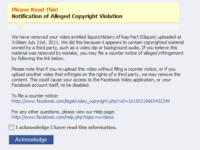The initial emphasis on last week’s Supreme Court of Canada’s copyright notice decision has focused on how Internet providers can pass along the specific costs associated with subscriber disclosures beyond those required for the notice-and-notice system to rights holders. The ruling rightly restores the notice system back to its intended approach, but it is not the only takeaway with implications for the recent flurry of file sharing lawsuits. While there has been a huge number of claims filed in Canada (with some surprisingly large settlements), the Supreme Court acknowledged important limitations in notice claims, noting that merely being associated with an IP address is not conclusive of guilt.
Archive for September 18th, 2018

Law Bytes
Episode 238: David Fraser on Why Bill C-2's Lawful Access Powers May Put Canadians' Digital Security At Risk
byMichael Geist

June 30, 2025
Michael Geist
June 23, 2025
Michael Geist
Search Results placeholder
Recent Posts
 Canadian Government Caves on Digital Services Tax After Years of Dismissing the Risks of Trade Retaliation
Canadian Government Caves on Digital Services Tax After Years of Dismissing the Risks of Trade Retaliation  The Law Bytes Podcast, Episode 238: David Fraser on Why Bill C-2’s Lawful Access Powers May Put Canadians’ Digital Security At Risk
The Law Bytes Podcast, Episode 238: David Fraser on Why Bill C-2’s Lawful Access Powers May Put Canadians’ Digital Security At Risk  Ignoring the Warning Signs: Why Did the Canadian Government Dismiss the Trade Risks of a Digital Services Tax?
Ignoring the Warning Signs: Why Did the Canadian Government Dismiss the Trade Risks of a Digital Services Tax?  Why Bill C-2 Faces a Likely Constitutional Challenge By Placing Solicitor-Client Privilege at Risk
Why Bill C-2 Faces a Likely Constitutional Challenge By Placing Solicitor-Client Privilege at Risk  The Law Bytes Podcast, Episode 237: A Conversation with Jason Woywada of BCFIPA on Political Party Privacy and Bill C-4
The Law Bytes Podcast, Episode 237: A Conversation with Jason Woywada of BCFIPA on Political Party Privacy and Bill C-4

